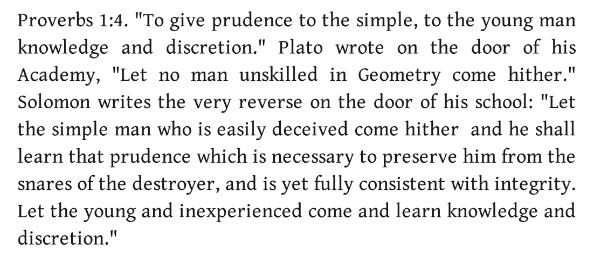Proverbs 1
Dec 9, 2022: Christianity Today: King Solomon’s Advice to Americans in 2023
The Book of Proverbs can be a humbling or even humiliating read. For every verse that lulls us into self-satisfaction of our righteousness comes another that aims its arrows at our own hearts too.
That incisive wisdom is particularly sharp when applied to election-year politics and our personal habits of political engagement. It’s uncanny enough to make us wonder whether King Solomon had foreseen cable news and Twitter. With another presidential election already underway, here are 30 proverbs for American politics in 2023
The Book of Proverbs can be a humbling or even humiliating read. For every verse that lulls us into self-satisfaction of our righteousness comes another that aims its arrows at our own hearts too.
That incisive wisdom is particularly sharp when applied to election-year politics and our personal habits of political engagement. It’s uncanny enough to make us wonder whether King Solomon had foreseen cable news and Twitter. With another presidential election already underway, here are 30 proverbs for American politics in 2023
|
Proverbs 1:1:
The proverbs of Solomon the son of David, king of Israel; |
Proverbs 25:1
These also are proverbs of Solomon which the men of Hezekiah, king of Judah, transcribed. "The Proverbs", the opening noun gives the book its name in the Hebrew Bible as in ours. The Hebrew term basically means 'a comparison' (e.g., the sharp simile such as --at random--11:23, 12:4; or the full grown allegory of Ezek 17:2 or Judges 9:8), but it came to stand for any kind of sage pronouncement from a maxim or observation to a sermon, and from a wisecrack (Ez 18:2) to a doctrinal revelation.
|
|
Proverbs 1:2:
To know wisdom and instruction, To perceive the words of understanding, |
The pursuit of wisdom and discernment is a quest or journey throughout the life of all men. Solomon displayed one of the greatest demonstrations of discernment in his request for wisdom over all other things. Wisdom is key to our success or failure in the major areas of life but it must be accompanied by discipline. Solomon possessed great wisdom but he lacked the disciple to live skillfully, which led to idolatry and eventually split the kingdom. --Free Online Bible Study |
Approach the Bible not only as a book which was once spoken, but a book which is now speaking.
– A. W. Tozer
– A. W. Tozer

The term for wisdom in vs. 2 is used 37 times in this book! It means skillfulness; the ability to use knowledge properly. It is possible to have lots of instruction and information in our head, and yet not have the wisdom to put it into practice in our daily lives. Knowledge isn’t enough. If it were, our generation would be doing just fine! Knowledge has doubled every year since 1955. We have more information and data than we know what to do with. But we do NOT have the wisdom to use it properly. The world has plenty of knowledge and information—but by anyone’s standards: the world today is a mess! -Salem Bible Church
|
It starts with the word "to know." True Biblical epistemology does not come from man or any other aspect of this creation; it comes from God's revelation, the Bible. Bruce Waltke's commentary categorically states, "no text in the book of Proverbs teaches that creation reveals wisdom!"(Ed Note: ??)
The same is true of true knowledge. We tend to use the terms "to know" or "knowledge" rather loosely about things we learn from science and opinions that are pretty certain. For example, I might informally say that I know that my wife is in this room. And by that I mean that I have an almost certain opinion. It’s not a justifiable knowledge, but I know it. But Proverbs uses the terms knowledge, understanding, and wisdom to refer to true knowledge; justified knowledge, which comes from Scripture alone. --Biblical Blueprints |

THE DEFINITION AND VALUE OF WISDOM A. DEFINING WISDOM...
1. "Wisdom...may be defined as a realistic approach to the problems of life..." - 20th Century Encyclopedia of Religious Knowledge 2. Homer Hailey offered this definition of wisdom: "Wisdom is insight into the underlying causes and significance or consequence of things, which insight enables one to apply to the best end the knowledge which he has." 3. To illustrate: a. You are yelled at by your boss, wife, or brother in Christ... 1) You could react in different ways a) Strike back physically, or verbally b) Do nothing c) React with a soft, kind reply - cf. Pr 15:1 2) Wisdom is that insight which helps you to decide what is the best thing to do b. Someone makes sexual advances towards you... 1) Again, you could react in several different ways 2) But wisdom will enable you to react in the proper way B. VALUATING WISDOM... 1. The first nine chapters of Proverbs are discourses extolling the value of wisdom 2. The virtue of wisdom is seen in the prosperous life it can produce - Pr 3:13-18 3. Its value is also found in guarding us against many pitfalls - Pr 3:21-26 4. Some "pitfalls" frequently warned against in The Book Of Proverbs: a. Evil companionship - Pr 1:10-19 b. The immoral woman - Pr 5:1-14 c. Laziness - Pr 6:6-11 [Certainly we should be able to see that wisdom is of great value. But let's go one step further and notice in particular the value of the book of Proverbs in regards to having wisdom...] --CCEL |
|
Proverbs is designed to give us WISDOM. The word “wisdom” in the context of Proverbs, means to have the skills to live life successfully. These skills cannot be learned in a classroom. They can only be learned by studying The Book of Proverbs. What the world and our educational system teaches us does not equate to wisdom. The mere fact the bible has been taken out of the classroom illustrates the lack of wisdom in man’s thinking and it illustrates the vanity and stupidity of the so called “wise men” of today. Secondly, Proverbs is designed to allow us to know instruction. Through the study of Proverbs, we receive the moral discipline needed to live one’s life successfully. Proverbs is full of instructions about moral discipline. Moral discipline can only come through God’s Word. Lastly, The Book of Proverbs teaches us understanding and discernment. A careful study of Proverbs provides the believer with the capability to distinguish between what is right and wrong, what is good or bad, and what matters most and what does not matter at all. --Gilbert Owen |

Verse Proverbs 1:2. To know wisdom — That is, this is the design of parabolical writing in general; and the particular aim of the present work.
This and the two following verses contain the interpretation of the term parable, and the author's design in the whole book. The first verse is the title, and the next three verses are an explanation of the nature and design of this very important tract. Wisdom — חכמה chochmah may mean here, and in every other part of this book, not only that Divine science by which we are enabled to discover the best end, and pursue it by the most proper means; but also the whole of that heavenly teaching that shows us both ourselves and God, directs us into all truth, and forms the whole of true religion. And instruction — מוסר musar, the teaching that discovers all its parts, to understand, to comprehend the words or doctrines which should be comprehended, in order that we may become wise to salvation. --Clarkes Commentary |

The terms of this proverb overlap and should not be isolated altogether from each other, but you may consider any shades of their meanings that are unique to them. The value of repetition of similar words is to emphasize the quality and quantity of the thing described (Pr 1:1-6). In other words, these proverbs are jammed pack full of every aspect of valuable learning that a man could desire.
He wants you to know wisdom, which is the power of right judgment. Wisdom knows what to do in any situation. It knows the right use of the best means for the best ends. It knows to choose the good and refuse the evil, and the reasons to do so (Is 7:15-16). He will tell you later that wisdom is the principal thing and you must have it (Pr 4:7).
He wants you to know instruction, which is the teaching of wisdom, knowledge, and understanding. He will be the teacher; you will be the student. What a blessed privilege! Instruction is the teaching discipline of education and training (Ps 32:8; Is 28:26). Without the book of Proverbs, who would instruct you in successful living?
He wants you to perceive understanding, which is the power of accurate discernment (I Kgs 3:9,11). A man with understanding comprehends and grasps a situation, or information, to properly identify its leading features and arrive at the correct knowledge of its difficulties, implications, and consequences. It is to know right from wrong, truth from error, light from darkness, integrity from fraud, and so forth. It is to perceive and approve things that are excellent (Phil 1:9-11). -Let God Be True
He wants you to know wisdom, which is the power of right judgment. Wisdom knows what to do in any situation. It knows the right use of the best means for the best ends. It knows to choose the good and refuse the evil, and the reasons to do so (Is 7:15-16). He will tell you later that wisdom is the principal thing and you must have it (Pr 4:7).
He wants you to know instruction, which is the teaching of wisdom, knowledge, and understanding. He will be the teacher; you will be the student. What a blessed privilege! Instruction is the teaching discipline of education and training (Ps 32:8; Is 28:26). Without the book of Proverbs, who would instruct you in successful living?
He wants you to perceive understanding, which is the power of accurate discernment (I Kgs 3:9,11). A man with understanding comprehends and grasps a situation, or information, to properly identify its leading features and arrive at the correct knowledge of its difficulties, implications, and consequences. It is to know right from wrong, truth from error, light from darkness, integrity from fraud, and so forth. It is to perceive and approve things that are excellent (Phil 1:9-11). -Let God Be True

Solomon is not just making his son & his readers aware of additional instructors – he is seeking to replace all other earthly instructors with virtue; with wisdom, justice, judgment and equity. He is introducing virtue (verse 2) so that ultimately, its instruction will be received (verse 3). He is introducing virtue so that it will stand out above all other instructors and gain the ear and mind of Solomon’s readers. Not only is this written intention important to understand when considering the Book of Proverbs but this same approach is important to emulate when in the business of sharing wisdom with others. Whether in parenthood, evangelism, discipleship or in any form of teaching, let it be our ultimate goal to see our listeners receive the instruction of wisdom, justice, judgment and equity. Let us understand the necessity of first making them aware of virtue but let us ultimately see the supreme goal of seeing our listeners receive the life-changing wisdom that these virtues have to offer. Such an approach will result in a passionate declaration & exposition of wisdom that brings with it the greatest potential of being received by the hearer. --Pastor Kevin Kabel
|

Justice is the perfect requirement of God as demanded in His Word or Law if you prefer. The same word is translated more frequently as righteousness. To obtain the positive justice of God, in the form of righteousness, perfect obedience is required. Following the birth and death of Christ the handwritten requirements which were against us as failed sinners and wicked children (Eph 2:14-16; Col 2:11-15) were canceled out completely. The resurrection of Christ demonstrated the price paid for sin triumphantly and removed forever the wrath of God against His chosen people. In this is our great joy and comfort, but what of fear?
Justice exacts fear in the form of awe in the hearts and minds of believers. It is a correct recognition of YHWH as father, Jesus as son and atonement, and the application of the Spirit imparting to the elect the instruction of wisdom regarding the truth of God’s love. Fear is also manifested in us when we in the grip of wisdom’s knowledge and instruction, daily struggle to work out in this life our salvation in fear and trembling. It is the wisdom and knowledge which brings to the hearts and minds of believers the awe of God in the form of fear. (Phil 2:12-13) In truth all human examples fail to clearly rectify our ability to understand the power of fear motivated out respect, love, reverence, terror and honor. This is why the Spirit of God is conforming us to the image of His son (Acts 9:31; 2 Cor 6:14-7.1) The knowledge imparted as the instruction of wisdom is received is part of the imputation of Christ’s righteousness to us as His chosen vessels. It is an awesome place to find ourselves in. To live with this knowledge each day, moment by moment, this is living in the fear of the LORD. -Bible Freak |

Verse 3. - To receive the instruction of wisdom. This verse carries on the statement of the design of the Proverbs. To receive; Hebrew, לְקַחַת (lakakhath), not the same word as "to know" (לָדַּעַת), in ver. 2, though regarded as synonymous with it by Delitzsch. Its meaning is well represented by the LXX. δέξασθαι, and the Authorized Version "to receive." The Hebrew, לָקַחַת, is infinitive, and means properly "to take, or lay hold of," hence "to receive," Greek, δέχομαι, No doubt it conveys the idea of intellectual reception (cf. Proverbs 2:1). The instruction of wisdom; Hebrew, מוּסַר הַשְׂכֵּל (musar has'kel); i.e. the discipline or moral training which leads on to reason, intelligence, or wisdom (as Hitzig, Fuerst, Zockler); or discipline full of insight, discernment, or thoughtfulness (as Umbreit, Ewald, Delitzsch). The phrase does not mean the wisdom which instruction imparts. The word musar occurs here in a slightly different sense from its use in ver. 2; there it is objective, here its meaning as a medium for the attainment of wisdom is more distinctly brought out. Wisdom (haskel) is properly "thoughtfulness" (so Umbreit. Ewald, Delitzsch, Plumptre). It is strictly the infinitive absolute of שָׂכַל (sakal), "to entwine or involve," and as a substantive it stands for the thinking through of a subject, so "thoughtfulness." The LXX. renders this sentence, δέξασθαί τε στροφὰς, which St. Jerome understands as "versutias sermonum et solutiones aenigmatum" ("the cunning or craftiness of words and the explication of enigmas"). Justice, and judgment, and equity. These words seem to be the unfolding of the meaning contained in the expression, "the instruction of wisdom." Holden regards the last four words as objective genitives dependent on "instruction," but wrongly. Cornelius a Laplde states that "justice and judgment and equity" indicate the same thing in different aspects. "Justice stands for the thing itself - that which is just; judgment in respect of right reason, which says it is just; and equity in respect of its being agreeable to the Law of God." Justice; Hebrew, צֶדֶק (tsedek), from the root צָדַק (tsadak), "to be right, or straight;" in a moral sense it means "rectitude," "right," as in Isaiah 15:2 (Gesenius). The underlying idea is that of straightness. Heidenheim, quoted by Delitzsch, maintains that in tsedek the conception of the justum prevails; but the latter enlarges its meaning, and holds that it also has the idea of a mode of thought and action regulated, not by the letter of the Law, but by love, as in Isaiah 41:2; Isaiah 42:6. Plumptre thinks "righteousness" would be a better translation of the word, on the ground that the Hebrew includes the ideas of truth and beneficence. Compare with this the LXX. δικαιοσύνη. Zockler also renders "righteousness," i.e. "that which is in accord with the will and ordinances of God as Supreme Judge." In the Authorized Version, in Proverbs 2:9, where we have the same collocation of words, tsedek is translated "righteousness;" cf. Proverbs 12:17, "He who utters truth shows forth righteousness (tsedek)." Judgment; Hebrew, מְשְׁפָּט (mish'pat), from the root שָׁפַּט (shapat), "to adjust, judge," corresponds with the Hebrew in meaning; it is the delivery of a correct judgment on human actions. Compare the LXX. κρίμα κατευθύνειν. Equity; i.e. rectitude in thought and action (Delitzsch), or integrity (Zockler). This quality expresses upright demeanour or honoumble action on one's own part individually, while "judgment" has regard both to our own and the actions of others. The Hebrew, mesharim (מֵשָׁרִים), used only in the plural, is from the root יָשַׁר (yashar), "to be straight or even," and is equal to "uprightness." The plural form is reproduced in the marginal reading "equities;" comp. Psalm 17:2, "Let thine eyes beheld the things that are equal (mesharim)." The Vulgate reads aequitas and the Syriae rectitudo. The two ideas in judgment and equity appear to be expressed in the LXX. by the phrase. κρίμα κατευθύνειν.
John Phillips - The word translated "simple" (naive) means "artless, guileless, unsuspecting." Some people are so gullible that they believe everything they are told. They are easy prey for the con man. Solomon wanted us to be prepared to meet such deceivers. Eve in her guileless innocence was no match for the old serpent who appeared before her in disguise; he was persuasive but full of malice and malignity. His mind, created for the universe, was narrowed by sin to a diabolical cunning. However Eve had one weapon the devil feared. Eve had the Word of God, which would have rendered her invincible, had she relied on it. All she needed to say in response to each temptation was "Thus saith the Lord." Solomon wanted to put this same almighty Word into the hands of the simple. A mastery of the book of Proverbs will go far toward equipping even the most guileless for life's treacheries."
John Trapp on prudence (subtilty)- Serpentine subtilty, {Ge 3:1} sacred sagacity, a sharp wit, a deep reach, a Spirit that "searches all things, yea, the deep things of God," {1Co 2:10} and transforms a man "into the same image from glory to glory." {2Co 3:18-note}
John Trapp on prudence (subtilty)- Serpentine subtilty, {Ge 3:1} sacred sagacity, a sharp wit, a deep reach, a Spirit that "searches all things, yea, the deep things of God," {1Co 2:10} and transforms a man "into the same image from glory to glory." {2Co 3:18-note}
Proverbs 8:5 "You simple people, use good judgement. You foolish people, show some understanding." (NLT)
Psalm 19:7 "The instructions of the Lord are perfect, reviving the soul. The decrees of the Lord are trustworthy, making wise the simple. (NLT) -- I remember a memory chorus that runs from verses 7-11. Such songs go far in helping to memorize important passages! If only more were set to music!
Psalm 119:130 "The teaching of your word gives light, so even the simple can understand." (NLT)
Psalm 19:7 "The instructions of the Lord are perfect, reviving the soul. The decrees of the Lord are trustworthy, making wise the simple. (NLT) -- I remember a memory chorus that runs from verses 7-11. Such songs go far in helping to memorize important passages! If only more were set to music!
Psalm 119:130 "The teaching of your word gives light, so even the simple can understand." (NLT)
|
Proverbs 1:5:
A wise man will hear and increase learning, And a man of understanding will attain wise counsel, |

Listening. “A wise man will hear.” Wisdom begins with a hearing ear. But most people use their mouth more than their ears. Someone has said that we have two ears and only one mouth which tells us the ratio of talk to listening. If we did listen twice as much as we talked, we would all be much wiser. Of course, it makes a big difference regarding what you are listening to with your ears. This verse implies that you are listening to truth and righteousness, to godly counsel, to God’s Word. However, many men prefer to listen to the lies of the world rather than to the truth of God. [SOURCE: Glenwood Devotional
|
What we are in search of, is right in front of us. We are trying to solve problems and come up with solutions that have a process that we can not circumvent. There are procurers that we must know. Could a doctor perform a heart transplant without the necessary education and training to do it? To accomplish anything in life, we must have knowledge. There are more bibles in circulation than any other book ever written and it has the answers for life. That means that you will not have to search long to find one and you will have what you need to conquer the things that seem now to be insurmountable. -John Pfeifer
Proverbs 1:6:
6 To understand a proverb and an enigma, The words of the wise and their riddles.
6 To understand a proverb and an enigma, The words of the wise and their riddles.
Wear your learning, like your watch, in a private pocket. Do not pull it out merely to show that you have one. If asked what o’clock it is, tell it; but do not proclaim it hourly and unasked, like the watchman. -Lord Chesterfield
Proverbs 1:7
|
Proverbs 1:8-9:
My son, hear the instruction of your father, And do not forsake the law of your mother; 9 For they will be a graceful ornament on your head, And chains about your neck. |
The structure of the nine introductory chapters (1:8–9:18) follows the pattern of father, mother and son in an instructional setting, promoting wise behavior over foolishness. “My son, hear the instruction of your father, and do not forsake the law of your mother” (1:8). “My son” is addressed many more times (1:10, 15; 2:1; 3:1, 11, 21; 4:10, 20; 6:1, 3, 20; 7:1), as direction is given to avoid the sins of laziness, deceit and promoting discord; and to avoid the company of sinners of various stripes: murderers, thieves, immoral women, oppressors, the scornful, adulterers. -David Hulm; Vision
|
|
Proverbs 1:10:
10 My son, if sinners entice you, Do not consent. |

“My son,” says Solomon, “if sinful men entice you,
do not give in to them.” Sin ‘entices’ – that’s an honest statement, but it’s not always said. I grew up being told that sin was evil and horrible, and no one would ever want any part of it. That teaching didn’t prepare me for the day when sin seemed very attractive, exactly what I would want to do. Sin is evil, and should always be shunned. That’s true. But what’s also true is that sin entices us. In the short term at least, we want what it offers, and we’re easily tempted to run to it rather than from it. So Solomon warns against those who make wrongdoing look attractive. He calls them “sinful men,” but the Hebrew word used means criminals, not just people of poor moral judgment. In this world there are very bad people who would lure away the innocent, and especially the naïve, to behavior they will regret. - Northern Seminary |
|
Proverbs 1:11:
11 If they say, “Come with us, Let us lie in wait to shed blood; Let us lurk secretly for the innocent without cause; |

let us lurk privily for the innocent without cause;
or "let us hide" {q}, the Vulgate Latin version adds "snares"; so Vatablus and others, as the fowler does for birds; or "let us hide ourselves" ; in some private place, waiting "for the innocent", the harmless traveller, who has done no injury to any man's person or property; thinks himself safe, and is not aware of any design upon him; going about his lawful business, and having done nothing to provoke such miscreants to attempt his life or take away his property: and which they do "without cause" as to him; "freely" as to themselves; and "with impunity" , as they promise themselves and one another; all which senses the word used will bear. -Gills Exposition |
Proverbs 1:13-21:
13 We shall find all kinds of precious possessions, We shall fill our houses with spoil;
14 Cast in your lot among us, Let us all have one purse”--
15 My son, do not walk in the way with them, Keep your foot from their path;
16 For their feet run to evil, And they make haste to shed blood.
17 Surely, in vain the net is spread In the sight of any bird;
18 But they lie in wait for their own blood, They lurk secretly for their own lives.
19 So are the ways of everyone who is greedy for gain; It takes away the life of its owners.
20 Wisdom calls aloud outside; She raises her voice in the open squares.
21 She cries out in the chief concourses, At the openings of the gates in the city She speaks her words:
13 We shall find all kinds of precious possessions, We shall fill our houses with spoil;
14 Cast in your lot among us, Let us all have one purse”--
15 My son, do not walk in the way with them, Keep your foot from their path;
16 For their feet run to evil, And they make haste to shed blood.
17 Surely, in vain the net is spread In the sight of any bird;
18 But they lie in wait for their own blood, They lurk secretly for their own lives.
19 So are the ways of everyone who is greedy for gain; It takes away the life of its owners.
20 Wisdom calls aloud outside; She raises her voice in the open squares.
21 She cries out in the chief concourses, At the openings of the gates in the city She speaks her words:
|
Proverbs 1:22:
22 “How long, you simple ones, will you love simplicity? For scorners delight in their scorning, And fools hate knowledge. |
 Kevin Schaal Kevin Schaal
Proverbs 1:22: How long, you simple ones, will you love simplicity? For scorners delight in their scorning, And fools hate knowledge.
The fool is best characterized by Proverbs 3:7. He is wise in his own eyes. He trusts his own mind above everything else (Proverbs 28:26). The fool rejects wisdom because he already thinks that he is wiser than anyone who might teach him. He walks through life with a sense of arrogance refusing to believe that he is wrong—almost ever—even when his foolish arrogance is staring him in the face. He thinks he knows more about the Bible than the preacher, more about life than his parents, more about money than the wise man, more about running a nation than the King, and more about everything than God (although he might deny that last one). He rejects knowledge, refuses warnings, takes the prominent seats at the banquets, is devoid of true humility, and despises those who do not feed the flames of his arrogance with fawning flattery. You cannot reason with him. If you try to correct him, he lures you into ridiculous arguments, if you do not answer him, he takes your silence as an affirmation of his superiority (Proverbs 26:4-5). --Kevin Schaal; Proclaim & Defend; The Three Bad Men (or Women) of the Book of Proverbs 9.24.23 |
|
Proverbs 1:20-31:
20 Wisdom calls aloud outside; She raises her voice in the open squares. 21 She cries out in the chief concourses, At the openings of the gates in the city She speaks her words: 22 “How long, you simple ones, will you love simplicity? For scorners delight in their scorning, And fools hate knowledge. 23 Turn at my rebuke; Surely I will pour out my spirit on you; I will make my words known to you. 24 Because I have called and you refused, I have stretched out my hand and no one regarded, 25 Because you disdained all my counsel, And would have none of my rebuke, 26 I also will laugh at your calamity; I will mock when your terror comes, 27 When your terror comes like a storm, And your destruction comes like a whirlwind, When distress and anguish come upon you. 28 “Then they will call on me, but I will not answer; They will seek me diligently, but they will not find me. 29 Because they hated knowledge And did not choose the fear of the Lord, 30 They would have none of my counsel And despised my every rebuke. 31 Therefore they shall eat the fruit of their own way, And be filled to the full with their own fancies. |
In the first nine chapters, Solomon describes two women who compete for his son’s affection. Lady Wisdom urges simpletons to abandon their simplicity and warns them of the consequences if they refuse to listen (1:20–33). Lady Folly entices young men to dangerous liaisons. Lady Wisdom offers food, while Lady Folly plots to lead the prince to slaughter (7:22). Solomon tells his son to flee Lady Folly and embrace Lady Wisdom (5:1–23; 6:20–35; 7:6–27; 9:13–18). It’s a classic rom-com setup: A young man chooses between two women, one seductively transgressive, the other the kind of girl you take home to meet Mom. At the same time, he decides whether to listen to Dad or pursue his own bliss. - Peter Leithart; First Things
|




















